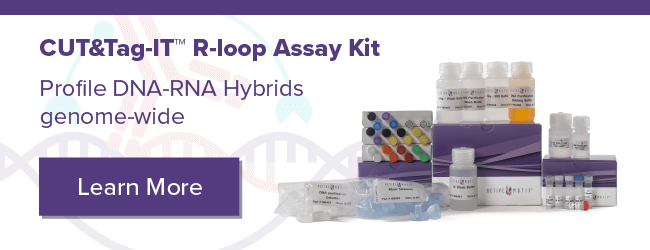<< Back to MOTIFvations Blog Home Page
An Epigenomic Compendium of Sporadic ALS Cases – R-loops & the DNA Methylome

February 22, 2024
Table of Contents:
Introduction – Our Current Understanding of Amyotrophic Lateral Sclerosis
The pathogenesis of the fatal neurodegenerative disorder amyotrophic lateral sclerosis (ALS) involves the progressive degeneration and then loss of motor neurons in the brain and spinal cord, which prompts the gradual deterioration of muscle control/function. Currently, ALS diagnosis represents a significant challenge given the similarity of ALS symptoms to other disorders (meaning that we lack disease-associated biomarkers) and our general lack of a deep understanding of the complex molecular causes.
While a continuously growing number of gene mutations have been linked to the familial form of the disease, the pathogenesis of sporadic ALS (90–95% of cases) likely involves an interplay between genetic and environmental factors (Cirulli et al., Suzuki et al., and Turner et al.). Interestingly, recent research has focused on how epigenetic changes may play significant roles in the development of sporadic ALS and may represent diagnostic markers of the disease.
Said changes include alterations to patient DNA methylomes (Hop et al.) and the formation of R-loops (Kannan et al., Farg et al., and Grunseich et al.) - nucleic-acid structures comprising single-stranded nascent RNA molecules interacting with double-stranded DNA that play crucial roles in the regulation of gene transcription and DNA repair (Santos-Pereira and Aguilera, 2015). Of note, R-loop accumulation correlates with the presence of elevated levels of DNA double-stranded breaks, which can induce genome instability, senescence, and apoptosis (Crossley et al., Santos-Pereira and Aguilera, and He et al.).
Creating an Epigenomic Compendium of Sporadic Amyotrophic Lateral Sclerosis Cases
The current status of ALS research and treatment prompted researchers led by Tamás Arányi (Research Centre for Natural Sciences/Semmelweis University, Budapest) and Lóránt Székvölgyi (University of Debrecen, Debrecen, Hungary) to perform a comprehensive and integrative epigenomic study in blood samples isolated from sporadic ALS patients (no family members with diagnosed with ALS) with well-defined clinical records and age-matched control individuals to uncover potential disease-linked molecular factors. Specifically, Feró and Colleagues extracted genomic DNA from 1 ml whole blood samples from ALS/control patients and then performed three simultaneous studies involving next-generation sequencing to generate databases that they could later integrate.
First, they evaluated the presence and DNA variants in 4813 genes commonly linked to human diseases through clinical exome sequencing (Lee et al.), which involved the enrichment of protein-coding regions of target genes through target capture microarray hybridization.
Second, they assessed the distribution/accumulation of chromosomal R-loops associated with genic and intergenic regions via DNA-RNA hybrid immunoprecipitation sequencing (DRIP-seq), which employed a monoclonal antibody that recognizes RNA-DNA hybrid sequences (Bou-Nader et al.) and a series of washing steps that employed distinct buffers (Halász et al.).
Third, they explored the implication of alterations to patient DNA methylomes at gene regulatory regions that influence gene transcription through reduced representation bisulfite sequencing (Meissner et al.). This analysis explored differentially methylated sites (per CpG) and differentially methylated regions (per 1000 bp window) and annotated sites/regions by the overlapping genic regions, including promoter, exon, intron, and transcription start sites.
They confirmed the high-quality nature of these next-generation sequencing-based datasets and then created a compendium of the genetic and epigenetic alterations associated with the studied sporadic ALS cases, which may support the definition of new correlations at the single-patient level and across patient cohorts. Furthermore, the authors state that the application of widely recognized software tools will permit data integration into any genome analysis workflow.
The Future Implications of this Epigenomic Compendium
This study represents the first step towards the creation of a massive database containing comprehensive information regarding genetic variants, DNA methylomes, and R-loop involvement from larger numbers of sporadic ALS patients, which will enable the correlation of these variables within and between individuals and unveil significantly involved epigenetic patterns. Overall, this approach should contribute to a better understanding of ALS and even support the development of new epigenetic therapies for this devastating neurodegenerative disease.
For more on these epigenomic analyses and the potential of this ALS compendium, see Scientific Data, January 2024.
About the author

Stuart P. Atkinson, Ph.D.
Stuart was born and grew up in the idyllic town of Lanark (Scotland). He later studied biochemistry at the University of Strathclyde in Glasgow (Scotland) before gaining his Ph.D. in medical oncology; his thesis described the epigenetic regulation of the telomerase gene promoters in cancer cells. Following Post-doctoral stays in Newcastle (England) and Valencia (Spain) where his varied research aims included the exploration of epigenetics in embryonic and induced pluripotent stem cells, Stuart moved into project management and scientific writing/editing where his current interests include polymer chemistry, cancer research, regenerative medicine, and epigenetics. While not glued to his laptop, Stuart enjoys exploring the Spanish mountains and coastlines (and everywhere in between) and the food and drink that it provides!
Contact Stuart on Twitter with any questions
Related Articles
Aberrant R-loops in Innate Immunity: Friend and Foe?
May 9, 2023
The accumulation of cytoplasmic RNA–DNA hybrids induced in response to aberrant R-loop processing provokes innate immune responses and cell death. In this blog we look at this potentially new disease-associated mechanism for cell death.
Read More
RNA Methylation Keeps R-loops Under Control to Maintain Genome Integrity
December 1, 2021
Ever hear of a DNA/RNA hybrid? These molecular structures, called R-loops, are an emerging “hot topic” in genome organization and stability – do they hold the key to therapeutic strategies that may protect against genome instability found in cancer and neurodegenerative diseases?
Read More
<< Back to MOTIFvations Blog Home Page








